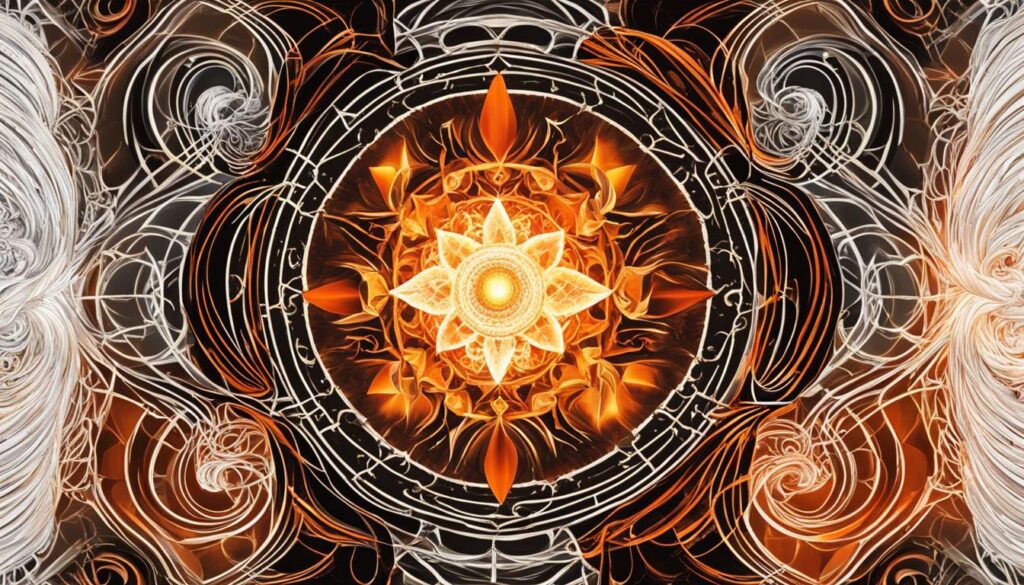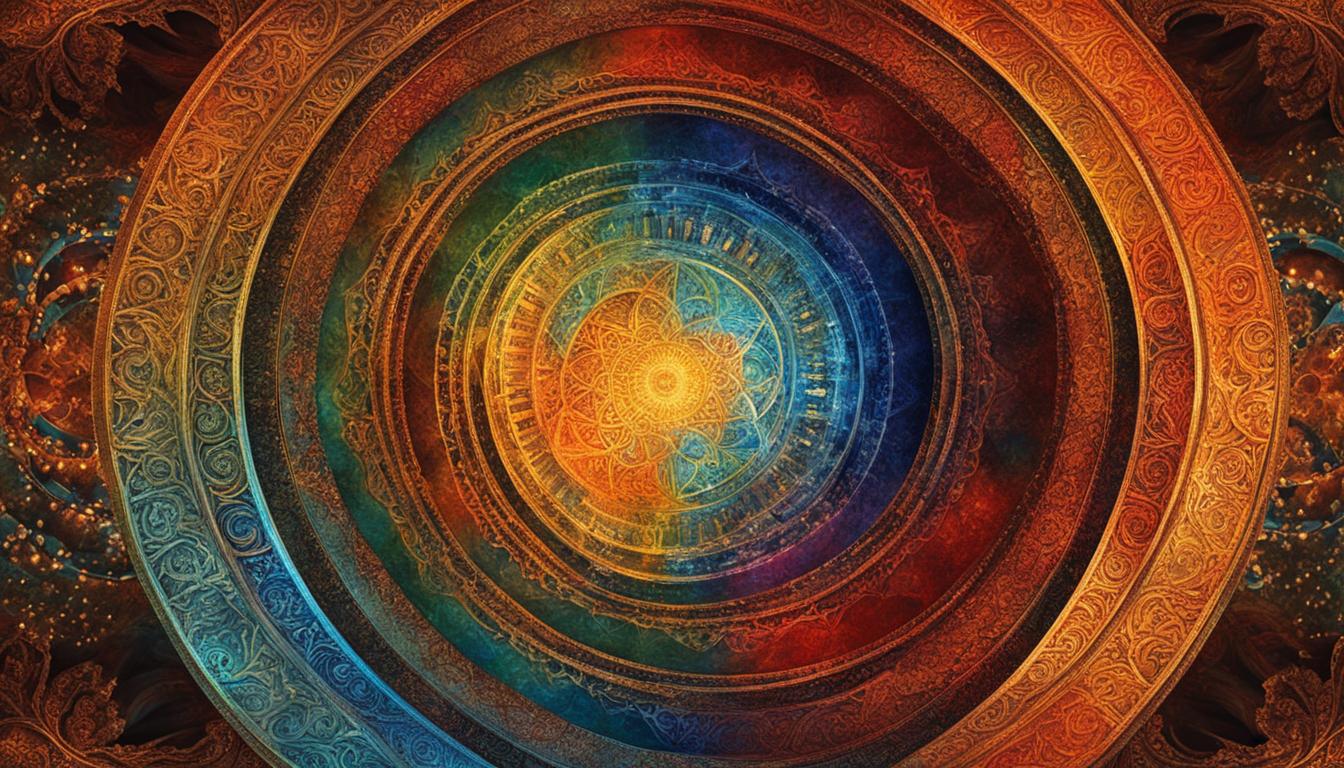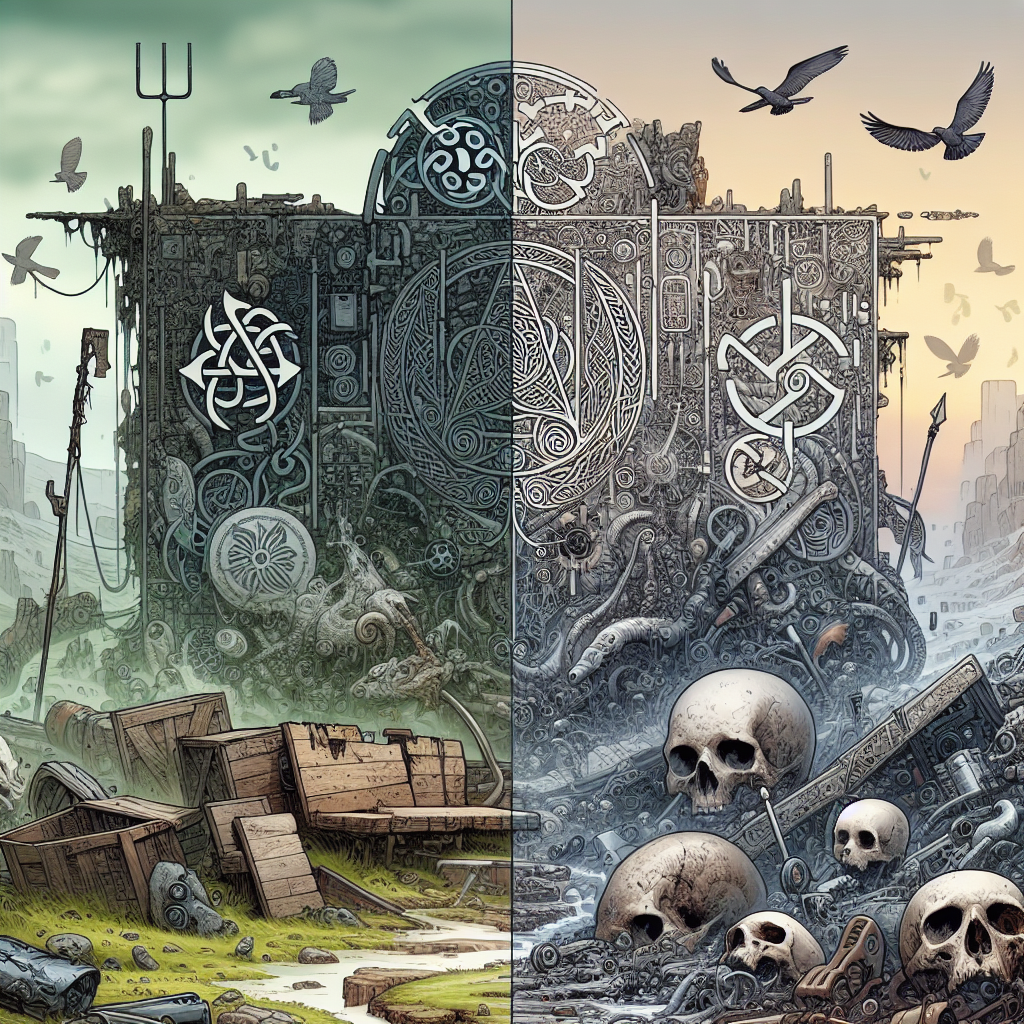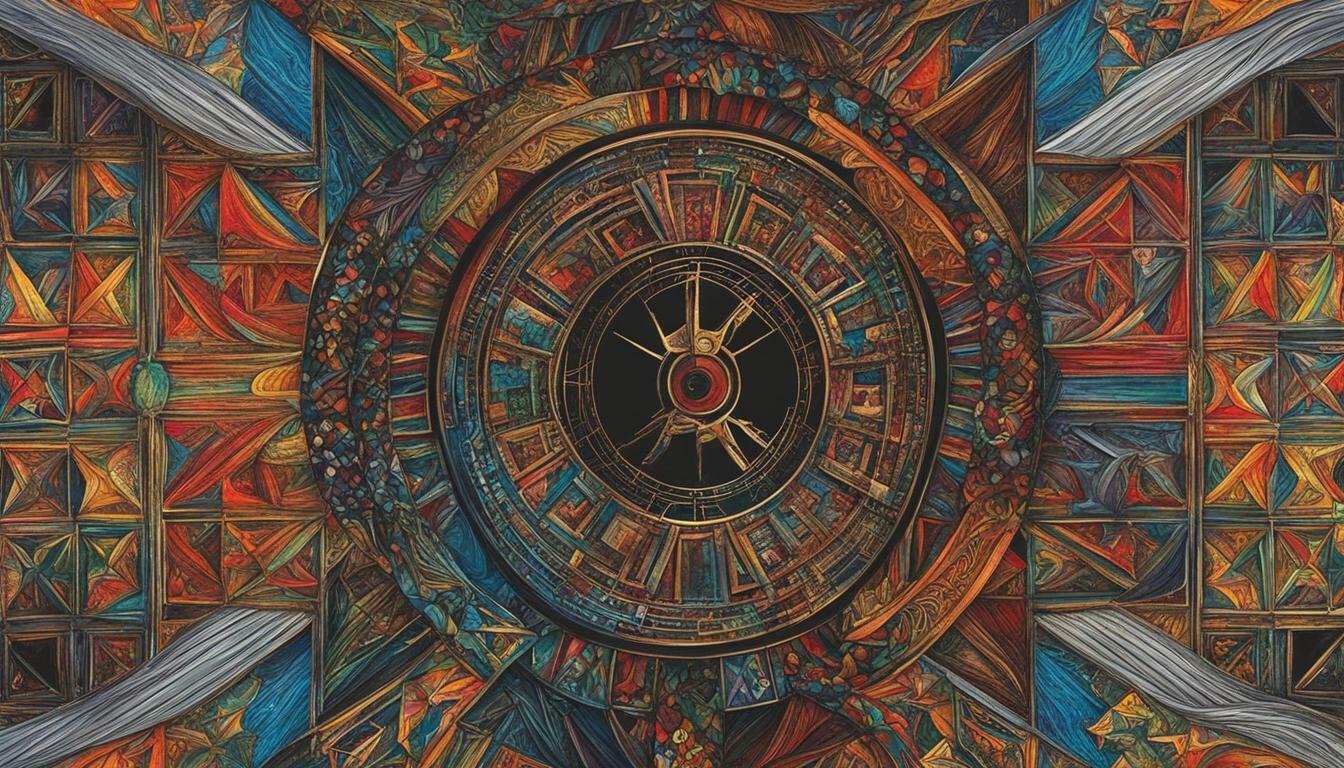Religious beliefs often encompass intricate spiritual concepts that shape our understanding of the world and ourselves. One such concept is the soul, which is explored differently in various religious traditions. In this article, we will delve into the difference between the soul in Christianity and Atman in Hinduism, two essential aspects of these faiths.
Christianity and Hinduism offer distinct interpretations of the soul and Atman, emphasizing their unique characteristics and significance within each religious framework. Understanding these differences will provide us with a deeper appreciation of the rich diversity present in religious beliefs and spiritual concepts.
Key Takeaways:
- The concept of the soul in Christianity and Atman in Hinduism are different interpretations of the spiritual aspect of a person.
- Christianity views the soul as inherently sinful, while Hinduism sees Atman as a divine essence already perfect.
- Salvation in Christianity is tied to the redemption of sinful souls through Jesus, while Hinduism focuses on the realization of the unity between Atman and Brahman.
- Hinduism also introduces terms like Jivatman and Self to refer to the individual soul, emphasizing its interconnectedness with the physical body and mind.
- Buddhism rejects the concept of a permanent soul or Atman, highlighting the idea of Anatman, the absence of a separate and eternal self.
Understanding the Soul in Christianity
In Christianity, the concept of the soul holds deep significance within religious beliefs and theological perspectives. According to Christian theology, the soul is seen as the spiritual essence of a person that continues to exist after the physical body dies. It is believed that only humans possess souls, which are considered to be inherently sinful by nature. The soul is closely intertwined with the physical body and is not viewed as a separate and immortal entity.
The Christian understanding of the soul emphasizes the need for redemption and salvation. It is believed that through Jesus Christ, individuals can find redemption for their sinful souls. Jesus is seen as the savior who offers the opportunity for salvation and the transformation of the soul. The soul is therefore seen as intimately connected to the concept of salvation and the ultimate goal of achieving eternal life.
Christian teachings on the soul emphasize the importance of the soul’s relationship with God. The soul is seen as the locus of one’s faith, beliefs, values, and moral character. It is through the soul that individuals establish a personal relationship with God and seek spiritual growth and transformation.
Overall, the Christian understanding of the soul underscores its inseparable connection to the physical body and the need for redemption and salvation through Jesus Christ. The soul is seen as the spiritual core of an individual, shaping their relationship with God and their journey towards eternal life.
Exploring the Concept of Atman in Hinduism
In Hinduism, the concept of Atman holds immense significance. Atman refers to the true self or the individual soul that exists within all living beings. It is believed to be eternal, immortal, and unchanging. Unlike the Christian belief that the soul is sinful by nature, Hinduism sees Atman as a divine essence that is inherently perfect.
Hinduism emphasizes the concept of self-realization, which involves recognizing one’s true nature as Atman. This realization leads to an understanding of the unity between Atman and Brahman, the ultimate reality. The goal is to transcend the cycle of birth and death and attain Moksha, liberation from the constraints of the material world.
To understand the significance of Atman in Hinduism, it is essential to explore the broader religious doctrines and spiritual concepts within which it is situated. Hindu philosophy teaches that Atman is present not only in humans but also in all living beings, including animals and plants. This belief in the interconnectedness of all souls reflects the holistic worldview of Hinduism.
| Soul in Christianity | Atman in Hinduism |
|---|---|
| Seen as inherently sinful | Considered divine and perfect |
| Salvation through Jesus | Realization of unity with Brahman |
| Individual focus on salvation | Recognition of interconnectedness |
The table above summarizes the key differences between the soul in Christianity and Atman in Hinduism. It highlights the contrasting theological perspectives and religious beliefs related to these concepts. While Christianity emphasizes the redemption of the sinful soul through Jesus, Hinduism emphasizes the realization of the true nature of Atman and the unity of all souls with the ultimate reality.
Key Differences Between the Soul in Christianity and Atman in Hinduism
While both Christianity and Hinduism acknowledge the existence of a spiritual aspect within humans, there are significant differences in their interpretations. Christianity views the soul as inherently sinful and in need of redemption through Jesus, while Hinduism sees Atman as a divine essence that is already perfect. Let’s explore some key differences between the soul in Christianity and Atman in Hinduism:
Theological Perspectives
In Christianity, the soul is considered to be sinful by nature. It is believed that the soul needs redemption through the sacrifice of Jesus in order to attain salvation. This perspective emphasizes the individual’s relationship with God and the importance of personal faith. In contrast, Hinduism sees Atman as inherently divine and perfect. It is believed that the true nature of Atman is obscured by ignorance and the cycle of birth and death. The goal is to realize the unity of Atman with Brahman, the ultimate reality.
Concept of Immortality
Christianity views the soul as not inherently immortal. The fate of the soul depends on one’s relationship with Jesus and acceptance of his sacrifice. Those who accept Jesus as their savior are believed to attain eternal life, while others may face judgment and eternal separation from God. On the other hand, Hinduism sees Atman as eternal and immortal, transcending the cycle of birth and death. The realization of the true nature of Atman leads to liberation from the cycle of reincarnation.
Focus of Salvation
Christianity places a strong emphasis on individual salvation and personal faith in Jesus. It is believed that salvation comes through accepting Jesus as the savior and following his teachings. The goal is to have a personal relationship with God and attain eternal life. In Hinduism, salvation is not seen as an individual pursuit, but rather as the realization of the unity of Atman with Brahman. The focus is on self-realization and liberation from the cycle of reincarnation.

| Aspect | Soul in Christianity | Atman in Hinduism |
|---|---|---|
| Theological Perspective | Views the soul as inherently sinful and in need of redemption through Jesus | Sees Atman as inherently divine and perfect |
| Concept of Immortality | Believes the soul is not inherently immortal; fate depends on salvation through Jesus | Views Atman as eternal and immortal, transcending the cycle of birth and death |
| Focus of Salvation | Emphasizes individual salvation and personal faith in Jesus | Sees salvation as the realization of the unity of Atman with Brahman |
The Relationship Between Soul, Atman, and Self
In Hinduism, the concepts of Atman, Jivatman, and Self are intricately intertwined, offering different perspectives on the individual soul and its connection to the physical body and mind. Atman, often used interchangeably with Jivatman, refers to the true self or individual soul in Hindu philosophy. It is believed to be eternal, unchanging, and present in all living beings, including humans, animals, and plants. The realization of one’s true nature as Atman is central to spiritual growth in Hinduism.
When exploring the relationship between Atman and the self, it is important to understand that Hindu philosophy sees the individual self as distinct from the physical body and mind, yet interconnected with them. This interconnectedness implies that the body and mind are vehicles through which the self experiences and interacts with the world.
On the other hand, in Christianity, the concept of the soul is closely tied to the physical body and is not seen as something separate or immortal. The soul is considered the spiritual part of a person that continues to exist after death, closely intertwined with the body and its identity. Unlike the Hindu perspective, Christianity views the soul as inherently sinful and in need of redemption through Jesus for salvation.
While both Hinduism and Christianity acknowledge the existence of a spiritual aspect within humans, their understanding of the relationship between the soul, Atman, and self varies significantly, reflecting the diversity of religious beliefs and spiritual concepts.
| Hinduism | Christianity |
|---|---|
| Atman refers to the eternal and unchanging true self in Hindu philosophy. | The soul is closely tied to the physical body and is seen as part of an individual’s identity. |
| Realization of Atman leads to self-realization and spiritual growth. | The soul is believed to be in need of redemption through Jesus for salvation. |
| The self is seen as distinct yet interconnected with the physical body and mind. | The soul is considered an inseparable part of the individual’s identity. |
The Influence of Cultural and Philosophical Perspectives
Evolution of the framework in different theology plays a significant role in shaping the concepts of soul and atman in religion. Christianity, influenced by Western philosophical traditions, views the soul as inherently sinful and in need of redemption through Jesus. This perspective is rooted in the monotheistic belief in a single, personal God who created humans with free will. In contrast, Hinduism, with its rich history of philosophical and spiritual traditions, emphasizes the interconnectedness of all beings and sees Atman as a divine essence that is already perfect.
Religious beliefs and cultural contexts also contribute to the contrasting interpretations of soul and atman. Christianity places emphasis on individual salvation and the afterlife, with the soul being closely tied to the body as an inseparable part of one’s identity. On the other hand, Hinduism focuses on self-realization and the unity of Atman with Brahman, the ultimate reality. The concept of Atman being present in all living beings, including humans, animals, and plants, reflects a reverence for the interconnectedness of life in Hindu thought.
Influences on Soul and Atman
The philosophical and cultural influences on the understanding of the soul and atman are multifaceted. Christianity’s roots in Western philosophical traditions such as Platonism and Aristotelianism have shaped its views on the nature of the soul and its relationship to the body. Hinduism, on the other hand, has been influenced by a variety of philosophical schools, including Advaita Vedanta and Samkhya, which have deepened and diversified its understanding of the nature of Atman.
| Cultural and Philosophical Perspectives | Christianity | Hinduism |
|---|---|---|
| View of the Soul/Atman | Inherently sinful, in need of redemption through Jesus | Divine essence, already perfect |
| Belief in Immortality | Dependent on salvation through Jesus | Atman is eternal and immortal |
| Emphasis | Individual salvation and the afterlife | Self-realization and unity with Brahman |
These diverse cultural and philosophical perspectives have contributed to the unique interpretations of soul and atman in Christianity and Hinduism. While Christianity places emphasis on individual redemption and a personal relationship with God, Hinduism explores the interconnectedness of all beings and the pursuit of self-realization. These differing perspectives provide profound insights into the understanding of the human spiritual experience and highlight the richness and complexity of religious beliefs and spiritual concepts.
Differences in the Concept of Immortality
The concept of immortality is a key point of distinction between the soul in Christianity and Atman in Hinduism. In Christianity, the soul is not inherently immortal, but its fate depends on salvation through Jesus. It is believed that through the redemption offered by Jesus, the sinful soul can attain eternal life in heaven. On the other hand, Hinduism views Atman as eternal and immortal, transcending the cycle of birth and death. The realization of one’s true nature as Atman leads to liberation from the cycle of reincarnation, achieving Moksha, or spiritual liberation.
To further understand the concept of immortality in both religions, it is important to highlight the theological perspectives that underpin them. In Christianity, the soul is seen as both dependent on and separate from the physical body. It is believed that the soul, with its unique identity, will be resurrected and reunited with the transformed body at the time of the final judgment. This final resurrection is a crucial aspect of Christian belief in the eternal life of the soul.
In contrast, Hinduism sees Atman as the divine essence that is already perfect and eternal. The ultimate goal is to recognize the unity of Atman with Brahman, the ultimate reality. This realization leads to the liberation of the individual self from the cycle of birth and death, allowing Atman to merge with Brahman. This concept of immortality in Hinduism is deeply rooted in the idea of the eternal nature of Atman and the interconnectedness of all beings.
| Christianity | Hinduism |
|---|---|
| The soul is not inherently immortal | Atman is eternal and immortal |
| Immortality is achieved through salvation in Jesus | Immortality is achieved through the realization of one’s true nature as Atman |
| The soul is resurrected and united with the transformed body at the final judgment | Atman merges with Brahman, escaping the cycle of reincarnation |
Comparing Buddhism’s Perspective on Soul and Atman
Buddhism, a derivative of Hinduism, presents a unique viewpoint on the concept of the soul and Atman. Unlike Hinduism, Buddhism rejects the existence of a permanent, eternal soul or Atman. Instead, it emphasizes the concept of Anatman, which translates to “no self” or “no soul.” This philosophy challenges the notion of a fixed and separate self, positing that attachment to the idea of a self leads to suffering.
In Buddhism, the relationship between Atman, Jivatman, and the mind, often referred to as the psyche, is not seen as a fundamental aspect. The focus is on transcending the illusion of self and realizing the interconnectedness of all beings. The goal is to attain enlightenment and reach a state of liberation from the cycle of birth and death.
By rejecting the concept of a permanent self, Buddhism offers a distinct perspective that differs from Hinduism’s emphasis on the eternal nature of Atman. This contrast highlights the diverse interpretations and philosophies within Eastern religious traditions, inviting a deeper exploration and understanding of the complexities surrounding the concept of the soul and its role in our spiritual journeys.
Buddhism and Hinduism: A Comparative Overview
| Buddhism | Hinduism | |
|---|---|---|
| Concept of Soul | Anatman – Rejects the existence of a permanent, eternal soul | Atman – Believes in the presence of an eternal, unchanging soul |
| Perspective on Self | Emphasizes the absence of a separate and permanent self | Recognizes the individual soul (Atman) as distinct from the body and mind |
| Goal | Attain enlightenment and liberation from suffering | Realize the unity between Atman and Brahman |
The comparison between Buddhism and Hinduism sheds light on the diversity of perspectives within Eastern spiritual traditions. While Hinduism embraces the eternal soul and the pursuit of self-realization, Buddhism challenges the concept of a fixed self and aims for liberation from attachment. Exploring these divergent beliefs encourages a broader understanding of spirituality and fosters an appreciation for the various paths individuals undertake in their quest for meaning and enlightenment.
Conclusion
The concepts of the soul in Christianity and Atman in Hinduism hold significant differences. Both religious traditions have their unique interpretations of the spiritual aspect of a person, resulting in distinct characteristics and theological perspectives.
In Christianity, the soul is perceived as the spiritual part of an individual that continues to exist after death. Christians believe that only humans possess souls, which are inherently sinful and require redemption through Jesus. The soul is closely intertwined with the physical body and does not possess inherent immortality. Salvation is achieved through Jesus’ redemptive power.
In contrast, Hinduism views Atman as the true self or individual soul, eternal, immortal, and unchanging. Atman is believed to reside within all living beings. Hinduism emphasizes self-realization, where the ultimate goal is to recognize the unity of Atman with Brahman, the ultimate reality.
Understanding these differences in religious beliefs and spiritual concepts enhances our appreciation for the rich tapestry of perspectives found within Christianity and Hinduism. It reveals the diverse theological traditions and unique insights each tradition offers into the nature of the soul and the true self.
FAQ
What is the difference between the soul in Christianity and Atman in Hinduism?
The soul in Christianity is seen as the spiritual part of a person that continues to exist after death and is considered sinful by nature. Atman in Hinduism refers to the true self or the individual soul, which is eternal, immortal, and already perfect.
Do only humans have souls in Christianity and Hinduism?
Yes, in Christianity only humans are believed to have souls. In Hinduism, Atman is present in all living beings, including humans, animals, and plants.
What is the relationship between the soul and the physical body in Christianity and Hinduism?
In Christianity, the soul is closely tied to the body and not seen as something separate or immortal. In Hinduism, the individual self or Atman is seen as distinct from the physical body and mind, but also interconnected with them.
How does salvation differ between Christianity and Hinduism?
Christianity believes that salvation comes through Jesus, who offers redemption for sinful souls. Hinduism emphasizes the realization of one’s true nature as Atman and the unity of Atman with Brahman, the ultimate reality.
What are the key differences in the conceptual framework of the soul and Atman?
The soul in Christianity is viewed as inherently sinful and in need of redemption, while Atman in Hinduism is considered a divine essence that is already perfect. Christianity focuses on individual salvation, while Hinduism emphasizes the unity of all souls with the ultimate reality.
Can the terms Atman, Jivatman, and Self be used interchangeably in Hinduism?
Yes, in Hinduism, Atman, Jivatman, and Self are often used interchangeably. They all refer to the individual soul or the true self.
What are the cultural and philosophical influences on the concept of the soul and Atman?
Christianity is influenced by Western philosophical traditions and developed within the context of monotheism, while Hinduism has a rich history of philosophical and spiritual traditions that emphasize the interconnectedness of all beings.
How does the idea of immortality differ between Christianity and Hinduism?
In Christianity, the soul is not inherently immortal, but its fate depends on salvation through Jesus. In Hinduism, Atman is believed to be eternal and immortal, transcending the cycle of birth and death.
How does Buddhism’s perspective on the soul and Atman differ from Christianity and Hinduism?
Buddhism rejects the concept of a permanent and eternal soul or Atman and instead emphasizes the idea of Anatman, the absence of a separate and permanent self.
 Skip to main content
Skip to main content


